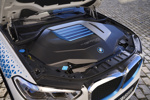The company says that any degree of uncertainty regarding the designation of a used car will cause potential buyers to exercise greater caution and typically offer a lower price.
Glass's Market Intelligence consultant Alan Cole said: 'We have had numerous reports of this happening in the UK and it's a problem that's particularly evident at auctions where there is less opportunity to consult with the current owner about the true specification.
'For example, Rover has not only dropped model badging, but has also now deleted engine capacity badging. Many buyers lacking detailed knowledge of the marque will err on the side of caution so that, even if told a car is a 45 Connoisseur, some will only be prepared to bid as if it was a lower-specified 45 Impression or Classic.'
Cole suggests that problems also arise where a manufacturer increases the availability of special equipment packs with its new cars.
'Volvo has used these packs quite extensively, but they are not widely recognised in the used market. The value they add to the vehicle over the longer-term can be something of a grey area – for vendors and buyers alike,' he said.
Glass's Information Services believes intense competition within today's new car market has meant most manufacturers have been adding additional equipment free of charge to boost sales.
'We expect this to create further confusion for buyers and sellers in years to come once these cars enter the used market,' Cole said. 'Most non-expert buyers will be unclear about just how much, if anything, they should be paying for these extras. The onus falls heavily on the vendor to highlight the added specification assuming, of course, that they know in the first place.'















Login to comment
Comments
No comments have been made yet.